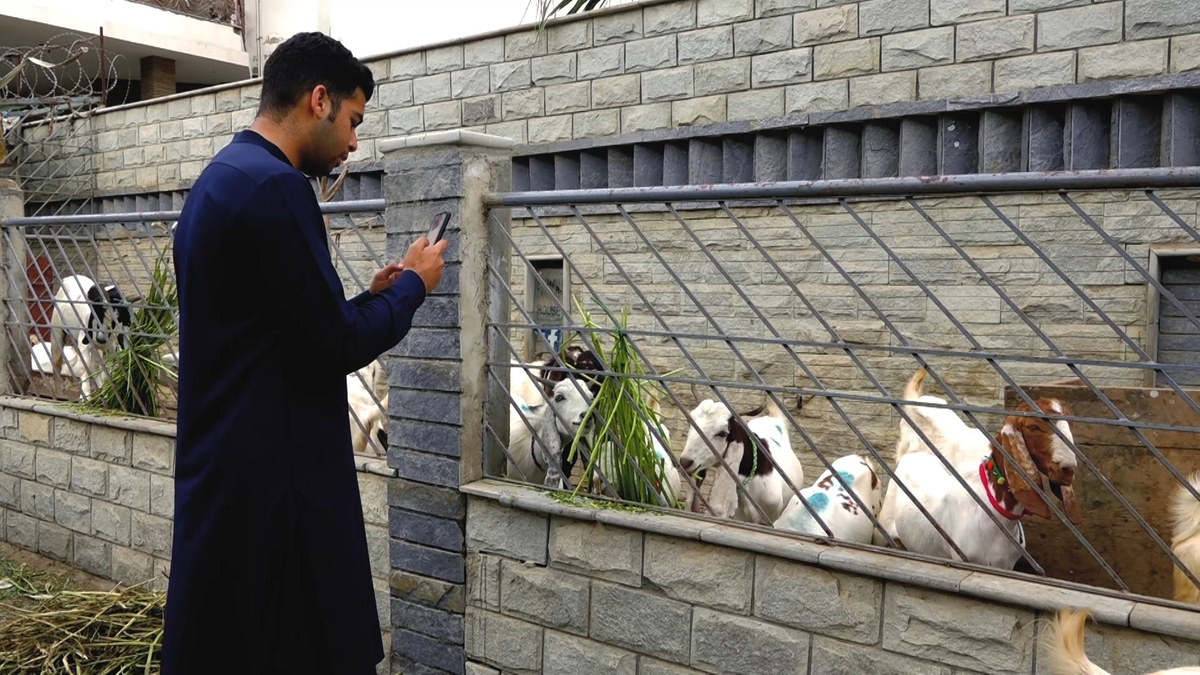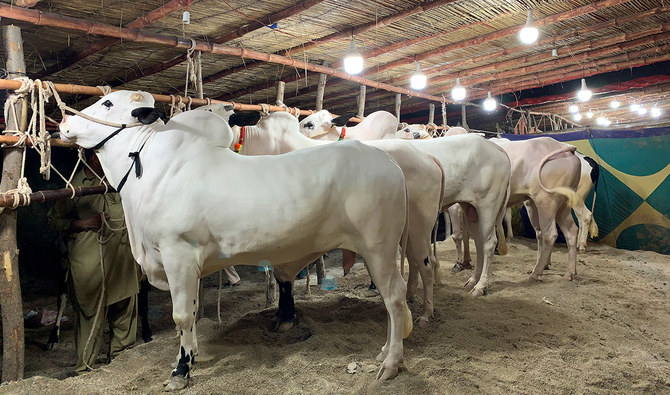KARACHI: Aleem Paracha intently watched over two dozen goats chewing hay and roaming around in a rectanglular fenced area outside his house, whipping out his cellphone every now and then and taking photos and making videos of the animals.
Later, Paracha, 35, will post the content on his Facebook page and then wait for buyers to start scrolling.
As Pakistani Muslims prepare to celebrate the Eid Al-Adha festival this Thursday, online sales of sacrificial animals are booming, limiting the need for people to visit crowded cattle markets, haggle for hours to buy the goats, sheep, cows and camels traditionally sacrificed at this time and then arrange expensive transportation to take them home while praying they don’t have to face security issues in crime-infested Pakistani towns and cities.
Indeed, customers preferred convenience over anything else, said Paracha, who has been a cattle trader for eight years now and for the past two years has turned online to sell animals from his home in Karachi’s Kokan Society. He currently has 47,000 followers on Facebook alone.
“Earlier, people would tell others or share information that goats were available [at different cattle markets] at low prices, so people would go there for purchase, ” Paracha told Arab News.

This still image taken from a video shows a man looking at sacrificial animals for sale online on his smart phone in Karachi, Pakistan, on June 24, 2023. (AN Photo)
“Now, 95 percent of my customers come to me after finding out about my business through social media as I keep uploading on a daily basis about the arrival of the stock and their prices … Even people living out of town [Karachi] are contacting me.”
“Due to this [social media] trend, I have witnessed growth in my business,” said Paracha, who has sold 1,108 goats this Eid season via social media platforms, up from 714 last year.
The trade of sacrificial animals for Eid is a lucrative business in Pakistan, where cattle farmers and seasonal cattle vendors earn billions of rupees through makeshift markets and individual sales each year. According to the Pakistan Tanners Association, six million animals were sacrificed during the three-day festival in 2022. And the large demand for cattle and Pakistan’s social media figures — the South Asian country has a mobile density of 81 percent, mobile broadband of 52.47 percent, and 53.8 percent Internet penetration as of April 2023 — is a winning combination.
It has definitely worked for Muhammad Usman Khan who said his sales had increased by an estimated 100 percent despite it being only his second year selling animals online.
“Already, people are mostly purchasing essential commodities online, so this matter of sacrificial animals is also similar,” Khan told Arab News.

The still image taken from a video on June 28, 2023, shows a man taking pictures of sacrificial animals in Karachi, Pakistan. (AN Photo)
He believed customers bought animals online to avoid the hassle and cost of transportation and to mitigate security concerns that came with traveling to cattle markets, most of which are situated on Karachi’s outskirts. This year, many residents have reported armed robberies near Karachi’s main cattle market and traders and citizens alike have called for enhanced security measures such as regular patrols by police and paramilitary Rangers to ensure the safety of people and the animals they purchase for the Feast of the Sacrifice.
Security concerns have also grown since the main cattle market in the city, which is the largest in Asia, was ordered by a court to relocate from its legacy location at Sohrab Goth to the more remote Northern Bypass area of the megacity.
“The more hassle-free the process is, the more people prefer it,” Khan said, describing why many people now prefer online shopping for animals.
“The rise of social media has made it easy for people to go online for shopping as they instantly know where to go and what the rates are, it is very easy for people,” Usama Ibrahim, a student, said, standing outside his house in Karachi and scrolling through photos of goats online.
Muhammad Owais, another online customer who is a businessman, said he picked his animals after learning through social media about a vendor who sold cattle behind Jinnah’s mausoleum.
“There were many such sellers there, so we went there, we liked the goats and bought them at a low price,” Owais told Arab News, saying he saved Rs15,000 by opting to buy a pair of goats with a single click of the mouse.
“I was able to save transportation costs and avoided security issues.”
Paracha said lower prices were another attraction of buying online.
“The price difference ranges between Rs4,000 to 5,000 per goat,” he said. “My prices are lower because if you buy animals from the open market, there are [additional charges] for entry fee and exit, which costs Rs2,500-3,000, approximately, so, the vendors there charge more.”
But Paracha also keeps his prices low because, like many other cattle traders, he loves his work.
“This is my passion,” he said, “so, I keep my margins low.”
















